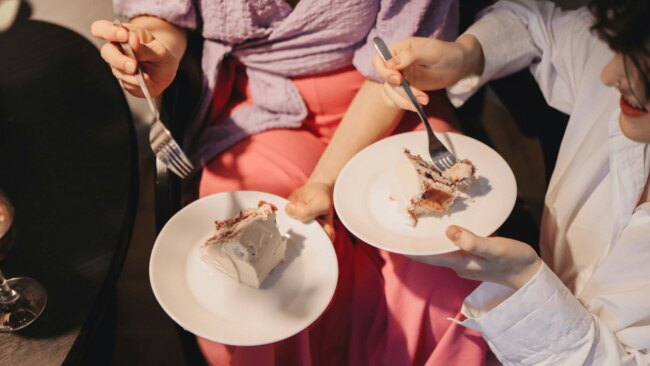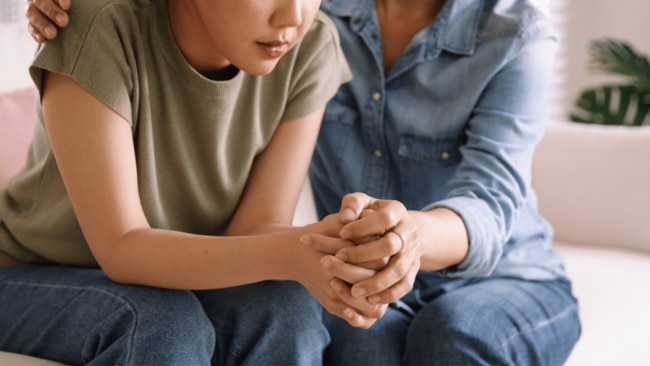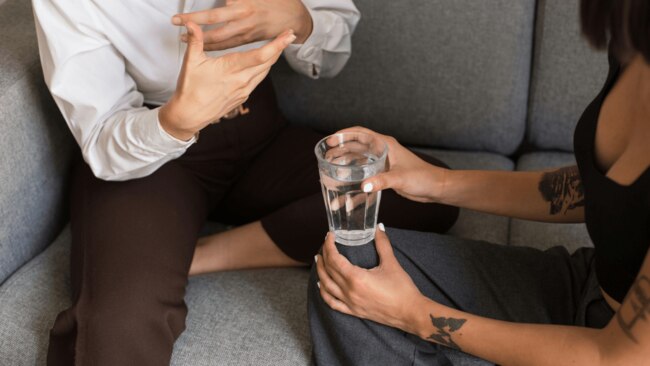Why does a friendship breakup feel so much worse than a romantic one?
Platonic love can break your heart too

Lifestyle
Don't miss out on the headlines from Lifestyle. Followed categories will be added to My News.
Friendship breakups can hurt just as much as romantic ones, so why aren't we talking about it more? Here, Ashley Lowe looks into the intricacies of female friendships, and asks clinical psychologist Dr Khristin Highet for her tips on navigating the fall-out.
If you feel like you’ve been seeing more ‘friendship’ content of late—you’re not alone. The topic of female friendship is well and truly swirling the zeitgeist (here's looking at you Charli XCX and Lorde), with countless articles, books, podcasts, and influencers speaking to its importance and how, in many cases, these close female bonds hold even greater influence in our lives than our romantic partnerships.
So for those of us who can relate and are willing to do almost anything to maintain our friendships, it can be understandably difficult when life takes us in different directions and our attention is pulled away from these relationships and towards other facets of our lives.
Dr Khristin Highet, clinical psychologist and mindset, performance, and relationship coach of Mind Evolution Enterprises agrees, telling Body+Soul “Close female friendships are an important source of support where emotional vulnerability, mutual care and backing each other through the highs and lows is shared—leading to a greater feeling of connectedness.
"However, through the normal progression of life particularly for women who may be going through changes in their study, career, romantic relationships, family responsibilities, and overall identity, it can be more challenging to put the same time and effort into friendships all of the time.”
“Our social network can inevitably become smaller over the years due to these changes and as a result, women can feel more isolated from their social supports, feel guilty or even frustrated they are not able to access these when needed, or even suffer the impacts of their own friends’ lives changing or their friendships not feeling the same as they once felt,” says Highet.
“There is also a wide social acceptance that romantic relationships can come and go in life, but when it comes to the longevity of our BFF relationships we can consider them to be for, well… forever, with the term itself reflecting the life-long value that is placed on such relationships.”

The bad news is this willingness to prioritise and pedestal our female friendships can often impact us greatly when they no longer meet our expectations. “Because of this high value placed on female friendships, they can be subject to fragility particularly when a friendship no longer offers what it once did,” says Highet.
The presence of social media and our ability to view other people’s relationships from such a close vantage point can also cause us to question our own bonds. “We often see the idealised concept of ‘sisters at heart’ when it comes to the essence of such friendships, where female friends are considered more like family," Highet continues. "I’m sure we would agree, that our hearts felt struck by the pang of sadness and tension when watching the fallout between best friends Eloise and Penelope in Bridgerton; with a felt inner turmoil that for many in the audience surpassed the emotional stirring involved in the romantic connection that was the main focus of the season.”
This is perhaps why when a friendship ends – no matter the circumstances – it can feel so painful and cause more grief than even the loss of a lover. “Feelings of grief from the loss of a relationship can be an extremely painful experience, with its severity not being exclusive to romantic relationships given the emotional intimacy associated with female friendships,” explains Highet.
“Female friendship breakups can bring about hurtful or complex feelings, particularly if we don't expect one to arise or even know these experiences can be common – leading women to feel there's something wrong with them, or a failure in some way.
"The nature and state of our friendships can be an important part of how we view ourselves, in that we are likeable and people care about us and have our backs. When this is no longer there, it can make us feel more isolated and less resilient in how we instinctually cope with life’s stressors.”

Unfortunately, there is also no set roadmap in terms of how to recover.
"There are endless compasses embedded widely into our culture through poetry, music, books, and social media content, leading our boats to shore towards healing from a romantic relationship breakup,” says Highet. “There are the universally known clichés of eating ice cream whilst crying to a friend over the phone, playing your favourite anthem of strength whilst singing along, or even going on an Eat, Pray, Love-style travel adventure (often with our girl tribe) to find ourselves again when we feel lost. But with friendship endings such blueprints are lacking, and because of this, these types of breakups are not as normalised as they should be.”
According to Highet, this can mean that our broader support networks often overlook these significant losses only leading us to feel even more lost, hurt, or confused.
“As close female friendships are built on openness, mutuality, trust, and understanding due to the higher level of intimacy associated when bonds like this break it can leave a void that feels deep and not easy to fill. Women are commonly told that there are plenty of fish in the sea when it comes to romantic relationship endings. But are there plenty of BFFs in this ocean too?” asks Highet.

Unlike the end of a romantic partnership when there’s usually (hopefully!) a conversation that takes place where you’re able to outline your feelings and frustrations, in female friendships there often isn’t the same dialogue.
“When it comes to female friendship challenges, [feelings are] often left unsaid and frustrations or resentment can accumulate where one may avoid bringing up anything for fear of creating unnecessary conflict,” says Highet. “‘Quiet quitting’ the relationship may happen, where a friend is iced out over time through avoidance, exclusion, or even ghosting leading the person on the receiving end to feel pushed out of their once-protective wolf pack.
"They can also feel anxious and confused due to not knowing where they stand. This is where things can feel incredibly painful, as the grief over the relationship loss can be delayed or complicated due to the ambiguity.”
So, how can we better protect ourselves – and our female friends – from feeling such heavy grief when a friendship ends? According to Highet, the key is to be kind: “It’s normal to feel a mix of emotions,” she says. “But there are things we can do to help us process our feelings of loss.

If you're going through a friendship breakup, try these expert-approved tips:
#1. Normalise how you feel and your experience
Show yourself compassion, and give yourself permission to grieve. It can also be helpful to understand that friendships are not always long-term and that this is normal.
#2. Take care of and invest in yourself
Prioritise your well-being on all levels: physical, emotional, and mental.
#3. Elevate your current relationships and cultivate self-growth
Putting conscious effort and initiative into your current relationships, spending time with people who uplift you, encourage you, and support you in your healing journey.
#4. Access support
Talking with someone is a beneficial way to process the difficult emotions associated with grief and if coping with the friendship breakup feels like an ongoing struggle it can be helpful to seek professional guidance.”

While painful, the loss of a close friendship can help us to build resilience.
“We are complex and imperfect beings that have vulnerabilities and changing needs,” says Highet. “Seeking perfection in relationships can act as a barrier to building deeper connection and intimacy so viewing every type of relationship as a gift with lessons to learn can be helpful; giving us the opportunity to grow, improve, and evolve.”
You can sign up for Ashley Lowe's newsletter, In the Thick of It, here.
More Coverage
Originally published as Why does a friendship breakup feel so much worse than a romantic one?




